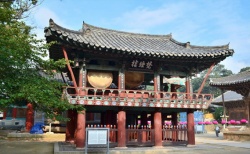Difference between revisions of "The Bell Pavilion"
(Created page with "thumb|250px| <poem> One of the most universally found structures at a Korean Buddhist temple, other than the main hall, is a bell pa...") |
|||
| Line 1: | Line 1: | ||
[[File:Tongdosa1.jpg|thumb|250px|]] | [[File:Tongdosa1.jpg|thumb|250px|]] | ||
<poem> | <poem> | ||
| − | One of the most universally found structures at a [[Korean]] [[Buddhist]] [[temple]], other than the main hall, is a [[bell]] | + | One of the most universally found structures at a [[Korean]] [[Buddhist]] [[temple]], other than the main hall, is a [[bell pavilion]]. Sometimes, these [[bell pavilions]] are [[nothing]] more than a smaller sized [[bell]], and sometimes these [[bell pavilions]] are large and ornately designed. However, a [[standard]] [[Korean]] [[Buddhist]] [[bell pavilion]] should have four different percussion instructions. These four are all percussion instruments; and yet, they all have different meanings and designs. So what exactly do each of the four look like, and what is the meaning behind each of their designs? |
| − | When you visit a [[Korean]] [[Buddhist]] [[temple]], you’ll be able to easily locate the [[bell]] | + | When you visit a [[Korean]] [[Buddhist]] [[temple]], you’ll be able to easily locate the [[bell pavilion]]. Usually, the [[bell pavilion]], better known as the [[Brahma Bell]] Pavilion, is in front and to the [[right]] of the main hall. The [[bell pavilion]] should house four percussion instruments. The first is the [[Brahma Bell]], and the second is the [[Dharma Bell]], the third is a [[Wooden Fish Drum]], and the fourth is the [[Cloud Shaped Drum]]. And the point of having the [[bell pavilion]] house all four of these instruments is to make [[offerings]]. What these [[offerings]] are, are completely dependent on the {{Wiki|individual}} instrument. |
| + | |||
| + | [[bell pavilion]]; | ||
</poem> | </poem> | ||
{{R}} | {{R}} | ||
Revision as of 11:23, 7 September 2013
One of the most universally found structures at a Korean Buddhist temple, other than the main hall, is a bell pavilion. Sometimes, these bell pavilions are nothing more than a smaller sized bell, and sometimes these bell pavilions are large and ornately designed. However, a standard Korean Buddhist bell pavilion should have four different percussion instructions. These four are all percussion instruments; and yet, they all have different meanings and designs. So what exactly do each of the four look like, and what is the meaning behind each of their designs?
When you visit a Korean Buddhist temple, you’ll be able to easily locate the bell pavilion. Usually, the bell pavilion, better known as the Brahma Bell Pavilion, is in front and to the right of the main hall. The bell pavilion should house four percussion instruments. The first is the Brahma Bell, and the second is the Dharma Bell, the third is a Wooden Fish Drum, and the fourth is the Cloud Shaped Drum. And the point of having the bell pavilion house all four of these instruments is to make offerings. What these offerings are, are completely dependent on the individual instrument.
bell pavilion;
